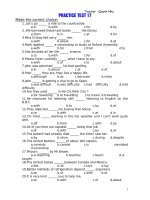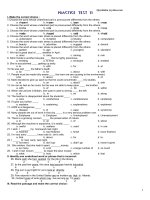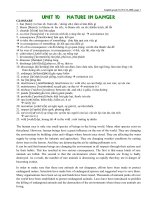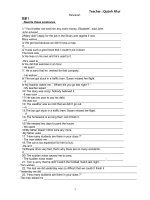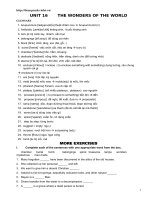- Trang chủ >>
- Đề thi >>
- Tuyển sinh lớp 10
PRACTICE TEST 34 NEW
Bạn đang xem bản rút gọn của tài liệu. Xem và tải ngay bản đầy đủ của tài liệu tại đây (92.04 KB, 7 trang )
PRACTICE TEST 34
NAME: ……………………………………….
PRONUNCIATION
Part 1. Mark the letter A, B, C or D on your answer sheet to indicate the word whose underlined part differs from the
other three in pronunciation in each of the following questions.
1. A. bear
B. pleasure
C. weapon
D. measure
2. A. garden
B. generous
C. ago
D. guess
Part 2. Mark the letter A, B, C or D on your answer sheet to indicate the word that differs from the other three in the
position of the primary stress in each of the following questions.
3. A. research
B. composer
C. machine
D. champion
4. A. supermarket
B. fascinating
C. photography
D. separated
5. A. acquaintance
B. profession
C. supportive
D. sacrifice
LEXICAL-GRAMMAR.
Part 1: Choose the best option (A, B, C or D) to complete each of the following sentences. Write your answers into
the box below.
1. The local people were not very friendly towards us, in fact there was a distinctly _____ atmosphere.
A. hostile
B. offensive
C. rude
D. abrupt
2. Valentine‟s Day, ______ from Roman, is now celebrated all over the world.
A. originate
B. originating
C. to originate
D. originated
3. The ______ cheered when the final goal was scored in the match today.
A. spectators
B. audience
C. onlookers
D. viewers
4. The purpose of the survey was to ______ the inspector with local conditions.
A. notify
B. instruct
C. acquaint
D. inform
5. William was 19 years old when he was _____ for war.
A. called up
B. made up
C. put up
D. brought up
6. I can’t give you the answer on the _____; I’ll have to think about it for a few days.
A. place
B. minute
C. scene
D. spot
7. The problem needs to be _____ urgently, otherwise it will be too late.
A. addressed
B. focused
C. monitored
D. checked
8. Tom looks so frightened and upset. He _____ something terrible.
A. should have experienced
B. must experience
C. can have experienced
D. must have experienced
9. In his latest speech, the Secretary General_______ the importance of wildlife conservation.
A. stressed
B. excused
C. extorted
D. remained
10. I'm sure it's not my fault that Peter found out what we were planning. I don't remember ________ anyone about it.
A. to tell
B. being told
C. having told
D. to be told
11. ________appears considerably larger at the horizon than it does overhead is merely an optical illusion.
A. What the Moon B. The Moon which C. When the Moon
D. That the Moon
12. I wish you ______ me a new one instead of having it ______ as you did.
A. had given/repaired
B. gave/to repair
C. would give/to repair
D. had given/to be repaired
13. ________ we invested in telecommunication industry, we would be rich now.
A. Should
B. Were
C. Would
D. Had
14. ________ we have finished the course, we should start doing more revision work.
A. For now
B. Now that
C. Ever since
D. By now
15. There are two small rooms in the beach house, ________ served as a kitchen
A. the smaller of which
B. the smallest of which
C. the smaller of them
D. smallest of that
16. People who are unemployed can receive the ________.
A. pension
B. dole
C. scholarship
D. allowance
17. Everyone knows about pollution problems, but not many people have ________ any solutions.
A. looked into
B. thought over C. got round to
D. come up with
18. The car burst into ________ but the driver managed to escape.
A. fire
B. burning
C. heat
D. flames
19. The little boy pleaded ________ his mother not to leave him alone in the dark.
A. on
B. in
C. with
D. at
1
20. It is the recommendation of many psychologists ________ to associate words and remember names.
A. that a learner uses mental images
B. that a learner use mental images
C. that a learner must use mental images
D. mental images are used
21. Sarah delivered a/an ________ appeal to the court and asked for mercy.
A. sensational
B. sentimental
C. emotional
D. affectionate
22. Of course I’ll play the piano at the party but I’m a little ________.
A. out of use
B. out of reach
C. out of turn
D. out of practice
23. She ________ modern art. She visits all the local exhibitions.
A. looks down on B. goes in for
C. fixes up with
D. catches up with
24. Unfortunately, I might have to leave for Boston ________.
A. for short notice B. under short notice
C. at short notice
D. to short notice
25. Her outgoing character contrasts ______ with that of her sister.
A. thoroughly
B. fully
C. sharply
D. coolly
Part 2. Complete the sentences with the suitable particles or prepositions. (10pts)
1. I got___________ the Arts Faculty at the University of London to study history.
2. Judging___________ the time of the day when something is done, one can decide how important an event is.
3. Frequently single- parent children take___________ some of the functions that the absent adult in the house would
have served.
4. The skyscraper stands out___________ the blue sky.
5. Why don’t you let me show you ___________ London?
6. Jean didn’t expect to come up___________ such difficulties .
7. Everyone was shocked___________ Susan’s strange appearance.
8. I came___________ one of your novels in a second-hand bookshop.
9. What you’re saying amounts___________ blackmail.
10. Your calculations do not accord___________ mine.
Part 3:
The passage below contains 10 mistakes. UNDERLINE the mistakes and WRITE THEIR
CORECT FORMS in the spaces provided in the column on the right. (0) has been done as an
example.
It was the human factor that contributes to the absolute majority of road accidents
which involves the tremendous toll of fatalities each year. Other, less decisive,
causes are vehicle functions or road shortcomings.
Speeding motorists are notorious about failing to give way at junctions, judging the
situation on the road or being unable to accurately estimate the distance while
overtaking the “snailpacers” ahead. Drinkers who settle behind the wheel after one
glass or two may be running the risk of causing a tragedy through their impairing
perception, which is not so rare a case, again.
Unfortunately, it is much simpler to introduce the necessary alterations in the traffic
system that change the behavioural patterns of drivers. There are voices that more
severe disciplinary resolutions ought to put into practice if the vehicle users are to
benefit from greater security on the road. The idea of producing safe road users
through pre-school parental instruction or through incorporating the safety
regulations for school curriculum has been widely acclaimed in many communities
and are expected to yield the required results as the first step in bettering the
qualifications of the future drivers and acquaint them with the potential hazards that
may arise en route.
0. _____ is ______
1. __________________
2. ___________________
3. ___________________
4. ___________________
5. __________________
6. ___________________
7. ___________________
8. ___________________
9. __________________
10. _________________
Part 4: Complete the following passage by writing the correct form of the words given in brackets. Write your
answers into the box below.
Casablanca
Casablanca is most (0. KNOW ) ............. as the title of a classic film from 1942 starring Humphrey Bogart and Ingrid
Bergman. But what about the city where this (1. ROMANCE )............. war film was set?
Casablanca (Spanish for white house), or Casa as it is known by those who live there, is the largest city in Morocco with a
(2. POPULATE) ............. of approximately 5 million and is the country’s (3. ECONOMY)............. capital. Rabat is the
political capital. Casablanca is situated in the west of Morocco on the Atlantic coast and boasts one of the world’s largest
2
artificial ports, a port which was very (4. STRATEGY)............. during the Second World War. At that time there was also
a large American airbase (5. SITE) ............. in Casablanca and in 1943 it was in Casablanca that a significant conference
took place where world (6. LEAD) ............. met to discuss the progress of the war.
Casablanca was (7. FORMAL )............. under the control of the French from 1910 until 1956 when Morocco gained (8.
DEPEND)................ French influence on the city is (9. EVIDENCE)............. in the city layout and architecture. French
is also the second language after Arabic. The city now has a growing (10. TOUR)............. .............. industry, although it
is not as popular as other Moroccan cities like Marrakesh and Fez.
Your answers: Example: 0. well-known
READING COMPREHENSION
Part 1: Read the following passage and choose the correct answer (A, B, C or D). Write them on your answer
sheet.
Body Language
Language is commonly believed to be a system of communication that consists of sounds and written symbols. We can
also communicate in other ways by using our facial expressions, our tone of voice and even our (1)______ body. Actually,
in many situations, non-verbal communication can (2)_____ more accurately what a person is feeling. Body language
always speaks the truth, (3)_____ words may often be (4)_______.
For successful communication both at the office and at home, an understanding of body language is important. At work,
non-verbal communication is (5)______ to power. For example, people (6)______ charge tend to lean back in their chairs,
fold their hands behind their heads and put their feet up on the desk or table. They often (7)_____ conversations, both
talking and interrupting more than others. Those who (8)_____ orders, on the other hand, are much less relaxed and tend
to sit on the (9)_____ of their chairs with their arms tightly folded.
Body language plays an equally important role at home. The interesting thing is that children are particularly quick to
pick up on non-verbal signals and can distinguish (10)_____ what is said and what is really meant.
1. A. full
B. whole
C. partial
D. total
2. A. explain
B. announce
C. publish
D. reveal
3. A. except
B. so
C. whereas
D. therefore
4. A. misleading
B. hopeless
C. mistrustful
D. senseless
5. A. associated
B. related
C. combined
D. reserved
6. A. on
B. in
C. by
D. at
7. A. overwhelm
B. dominate
C. master
D. hold
8. A. do
B. give
C. lead
D. follow
9. A. top
B. limit
C. edge
D. border
10. A. between
B. among
C. from
D. that
Part 2: Fill in each numbered blank with ONE suitable word to complete the passage below. Write it on your
answer sheet. (2.0 points)
When an animal species is (1) _______ endangered, it means that the International Union for Conservation of
Nature (IUCN) has evaluated it as nearly (2) _______, which means that a significant portion of its range has already died
(3) _______ and the rate of birth is lower than the species' death rate.
Today, more and more animal and plant species are on the verge of extinction because of a (4) _______ of major
factors that cause a species to become endangered, and as you might expect, humans play a role in quite a few of them - in
fact, the biggest threat to endangered animals is human encroachment on their habitats. By analyzing and grouping many
individual cases, (5) _______, we find the same broad causes appearing again and again. They are habitat destruction,
exotic species, and overexploitation. Among other (6) _______ threatening particular species are limited: distribution,
disease, and pollution. Limited distributions are often a (7) _______ of other threats: populations confined to one or a few
small areas because of habitat loss, for example, may be disastrously affected by random factors.
Diseases can have severe (8) _______ on species lacking natural genetic protections against particular pathogens,
like the rabies and canine distemper viruses that are currently devastating carnivore populations in East Africa. Domestic
(9) _______ are usually the reservoirs of these and other diseases affecting wild populations, showing once again that
human activities lie at the root of most causes of endangerment. Pollution has seriously done harm (10) _______ number
of terrestrial species, although species living in freshwater and marine ecosystems are also suffering.
3
Part 3: Read the following passage and choose the best answer (A, B, C, or D) for each question. Write your answer in
the numbered boxes.
Pollution emitted in industrial areas represents a threat to human health and the surrounding natural resources. We
have a tendency to believe that the production processes are the only source of environmental damage, and often forget
about the possible long-term effects of harmful production practices. We may think that the closure of these huge
industrial areas would improve the quality of the environment. Unfortunately, this ignores the threat of the remaining
waste, which is abandoned and poorly stored. It represents an even bigger danger because it stands neglected as it
degrades and leaks into the earth without any control at all.
Changes in the water chemistry due to surface water contamination can affect all levels of an ecosystem. It can
affect the health of lower food chain organisms and, consequently, the availability of food up through the food chain. It
can damage the health of wetlands and damage their ability to support healthy ecosystems, control flooding, and filter
pollutants from storm water runoff. The health of animals and humans are affected when they drink or bathe in
contaminated water. In addition water-based organisms, like fish and shellfish, can pile up and concentrate contaminants
in their bodies. When other animals or humans eat these organisms, they receive a much higher dose of contaminant than
they would have if they had been directly exposed to the original contamination.
Contaminated groundwater can badly affect animals, plants and humans if it is removed from the ground by
manmade or natural processes. Depending on the study of rocks of the area, groundwater may rise to the surface through
springs or seeps, flow sideways into nearby rivers, streams, or ponds, or sink deeper into the earth. In many parts of fhe
world, groundwater is pumped out of the ground to be used for drinking, bathing, other household uses, agriculture, and
industry.
Contaminants in the soil can harm plants when they take up the contamination through their roots. Eating,
breathing in, or touching contaminated soil, as well as eating plants or animals that have piled up soil contaminants can
badly affect the health of humans and animals.
Air pollution can cause breathing-related problems and other bad health effects as contaminants are absorbed
from the lungs into other parts of the body. Certain air contaminants can also harm animals and humans when they contact
the skin. Plants rely on breathing for their growth and can also be affected by exposure to contaminants moved in the air.
1. What is the topic of the passage?
A. Sources of environmental damage
B. The pollution from the city
C. Bad effects of industrial waste
D. The quality of the environment
2. According to the passage, the industry is likely to be thought as______.
A. a danger to the environment
B. the only source of pollution
C. the utmost harmful activity
D. a threat to human health
3. The word “it” in the first paragraph refers to______.
A. the remaining waste
B. a danger
C. the environment
D. the threat of the remaining waste
4. Which of the followings affect an ecosystem as the whole?
A. Surface water contamination
B. Soil contamination
C. Groundwater contamination
D. Air contamination
5. According to the passage, which of the followings supports healthy ecosystems?
A. Lower food chain organisms B. Animals
C. Water-based organisms
D. Wetlands
6. Which of the followings is NOT badly affected by contaminated groundwater?
A. Human
B. Plants
C. Rocks
D. Animals
7. Which of the followings is the flow of water from the ground to the surface?
A. Streams
B. Ponds
C. Rivers
D. Springs
8. Which of the followings has the closest meaning to the word “absorbed” in the last paragraph?
A. Consumed
B. Taken in
C. Swallowed
D. Piled up
Part 4. You are going to read an article about sleep and learning. Six sentences have been removed from the article.
Choose from the sentences A–G the one which fits each gap (1–6). There is one extra sentence which you do not need
to use.
College students need their sleep!
Research into the connection between sleep and learning suggests that sleep is even more important than previously
thought
Only a month and a half into her first semester at college, Liz, a student at Harvard University, already wishes she had
more time for sleep. Several mornings each week, Liz rises before six to join her teammates for rowing practice. On days
like these she seldom sleeps more than seven hours per night, but it’s not as if she doesn’t try.
4
(1) _____________ She often misses opportunities to socialize in order to get her coursework done and still get to bed at a
reasonable time. Even without knowing just how important sleep is to learning, she tries to make time for it.
This is not always easy, however. The many demands on her time include her chosen sport, as well as activities like
studying optional extra subjects. (2) ______________ She and other students who think the same way as her sacrifice
sleep to fit everything in. It isn’t surprising to learn, therefore, that students represent one of the most sleep-deprived
segments of the population. Coursework, sports and new-found independence all contribute to the problem.
Studies have found that only eleven percent of college students sleep well consistently, while seventy-three percent
experience at least occasional sleep issues, as Liz does. Forty percent of students felt well-rested no more than two days
per week. Poor sleep is no longer considered a harmless aspect of college. (3) ______________ The results of this show
that it has significant impact on memory and learning.
Inadequate sleep negatively affects our learning processes. It is simply more difficult to concentrate when we are sleep
deprived; this affects our ability to focus on and gather information presented to us, and our ability to remember even
those things we know we have learned in the past. (4) __________________ That is, the effect that many sleep
researchers think it has on memory consolidation, the process by which connections in the brain strengthen and form
into something more permanent.
A number of studies have shown that poor quality sleep can negatively impact on a person’s ability to turn factual
information or processes they’ve just learned into long-term memories. (5) ________________ And if this opportunity is
missed– such as when a student stays awake all night – it generally can’t be made up. Even if sleep is ‘recovered’ on
subsequent nights, the brain will be less able to retain and make use of information gathered on the day before. These
findings shed new light on the importance of making time for sleep, not only for college students like Liz, but for anyone
who wants to continue to learn.
Early in her first semester at Harvard, Liz feels like she is maintaining a healthy balance, but only just. Trying hard to get
the most out of her time in college, she admits it’s sometimes hard to see sleep as an important part of her athletic
and scholastic objectives. (6) _______________ Rather than thinking of sleep as wasted time or even time off, we should,
they say, instead view it as the time when our brain is doing some of its most important work.
A. Although it may seem unnecessary to do these, Liz views them as essential.
B. It also has a less obvious but possibly even more profound impact.
C. Liz knows that she must nevertheless do her best to avoid it.
D. Research suggests that the most critical period of sleep for this to happen in is the one on the same day.
E. In fact, Liz’s behaviour is not at all like that of other college students her age.
F. But that’s exactly what many researchers say it is.
G. Quite the opposite, actually, as research into its effects progresses.
Part 5. You are going to read four reviews of books about sleep and dreams. For questions 1–10, choose from the
reviews (A–D). The reviews may be chosen more than once. Mark your answers on the separate answer sheet.
Which review
1. emphasises how enjoyable sleep is?
2. says certain aspects of our lives are becoming less distinct from one another?
3. points out that many people share a mistaken belief?
4. describes the structure of the book?
5. explains why we have certain experiences?
6. mentions a practical problem faced by scientists?
7. says the book shows that major developments have occurred in a field?
8. says the writer deals with issues that cause debate?
9. comments that our lack of knowledge regarding sleep is surprising?
10. says the reader learns how a technological advance caused problems?
Four books about sleep
A Sleepfaring
Why do we sleep? Are we sleeping enough? How can we tackle sleep problems? Jim Horne finds answers to these
questions and many more in Sleepfaring, a journey through the science and the secrets of sleep. He reveals what goes on
in our brains during sleep, and also gives some hints from the latest sleep research that may just help you get a better
night’s rest. In recent years, understanding sleep has become increasingly important, as people work longer hours, styles
5
of working have altered, and the separation between workplace and home is being reduced by cell phones and the internet.
Horne draws on the latest research to reveal what science has discovered about sleep. Nor does Horne avoid controversial
topics; challenging, for example, the conventional wisdom on the amount of sleep we actually need. For anyone wishing
to know more about the many mysterious processes that begin when we close our eyes each night, Sleepfaring offers a
wealth of insight and information.
B Dreaming
What is dreaming? Why are dreams so strange and why are they so hard to remember? In this fascinating book, Harvard
researcher Allan Hobson offers an intriguing look at our nightly journey through the world of dreams. He describes how
the theory of dreaming has advanced dramatically. We have learned that, in dreaming, some areas of the brain are very
active – the visual and auditory centres, for instance – while others are completely shut down, including the centres for
self-awareness, logic, and memory. Thus we can have visually vivid dreams, but be utterly unaware that the sequence of
events or localities may be bizarre and, quite often, impossible. And because the memory centre is inactive, we don’t
remember the dream at all, unless we wake up while it is in progress. With special boxed features that highlight intriguing
questions – Do we dream in colour? (yes), Do animals dream? (probably) – Dreaming offers a cutting-edge account of the
most mysterious area of our mental life.
C Counting Sheep
Even though we will devote a third of our lives to sleep, we still know remarkably little about its origins and purpose.
Does getting up early really benefit us? Can some people really exist on just a few hours’ sleep a night? Does everybody
dream? Do fish dream? How did people cope before alarm clocks and caffeine? And is anybody getting enough sleep?
Paul Martin’s Counting Sheep answers these questions and more in this illuminating work of popular science. Even the
wonders of yawning are explained in full. To sleep, to dream: Counting Sheep reflects the centrality of these activities to
our lives and can help readers respect, understand, and appreciate that delicious time when they’re lost to the world.
D Dreamland
Reporter Randall provides a brisk tour of sleep research and what it means for individuals hoping to feel well rested. The
author engaged with sleep research in part because of his sleepwalking. Researching the world of sleep is obviously
difficult because sleeping subjects selected for studies rarely remember anything specific. Nonetheless, Randall
interviewed sleep researchers and read academic papers to learn what he could from those who devote their careers to the
science of sleep. The book is not a continuous narrative but rather a loose progression of chapters about different sleeprelated issues. For example, Randall explains how the invention of electricity led to countless cases of sleep deprivation;
the lack of utter darkness after sunset is often the enemy of sound sleep. He also emphasises the too-often neglected
common-sense realisation that sleep is no void; rather, it is perhaps one third of the puzzle of living well.
IV. WRITING
Part 1: Finish each of the following sentences in such a way that it means exactly the same as the sentence
before it.
1. Something must be done to help the victims of the earthquake in Mexico.
Urgent ……………………………………………………………………
2. It was careless of you to allow your 16-year-old son to drive your car.
You should ……………………………………………………………………….…………………………………
3. I shall never lend John any money, no matter what happens.
Under no ………………………………………………………………….……………………………………
4. Someone has suggested abolishing income tax.
It ……………………………………………………….………………………….……………….……
5. Thank you for reminding me about the timetable, otherwise I would have missed the last train.
If…………………………………………………………………………………………….……
Part 2: Rewrite each of the following sentences in such a way that it is as similar as possible in meaning to the
original sentence. Use the word given and other words as necessary. Do not change the form of the given word.
Write the answers on your answer sheet (1.0 point)
1. They continued to suggest that I was lying.
(PERSISTED)
à _________________________________________________________.
2. This is the first time I have seen her in my life.
(SET)
à _________________________________________________________.
3. His irresponsible attitude is endangering his career as a doctor.
(JEOPARDY)
à _________________________________________________________.
4. The police arrived as the thieves were committing the crime.
(RED-HANDED)
à _________________________________________________________.
6
5. Some people say that Tsiolkovsky invented the space rocket
(CREDITED)
à _________________________________________________________.
7

